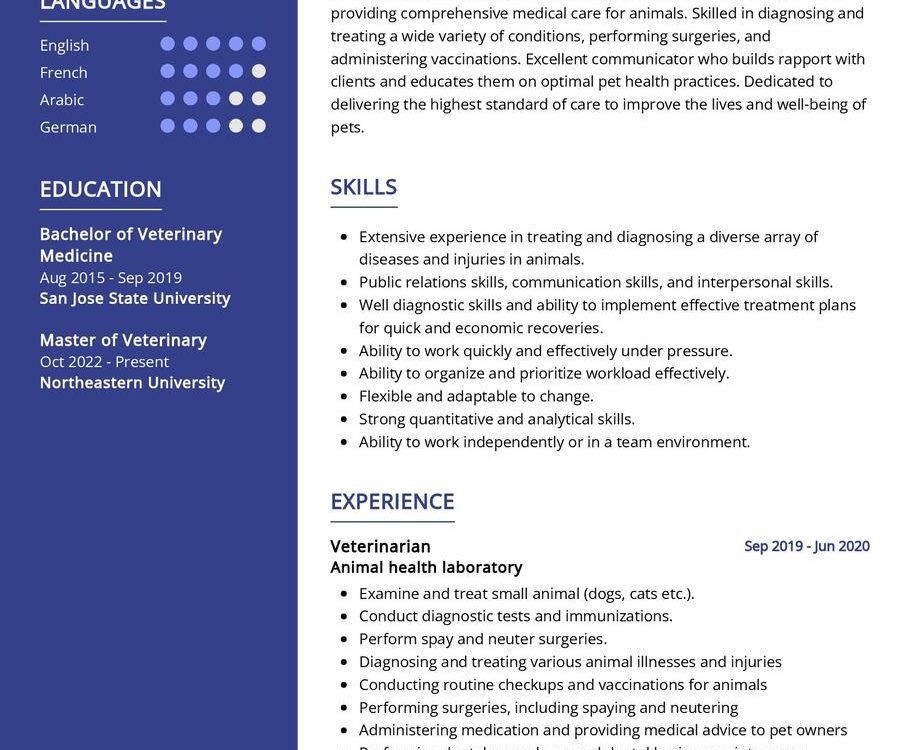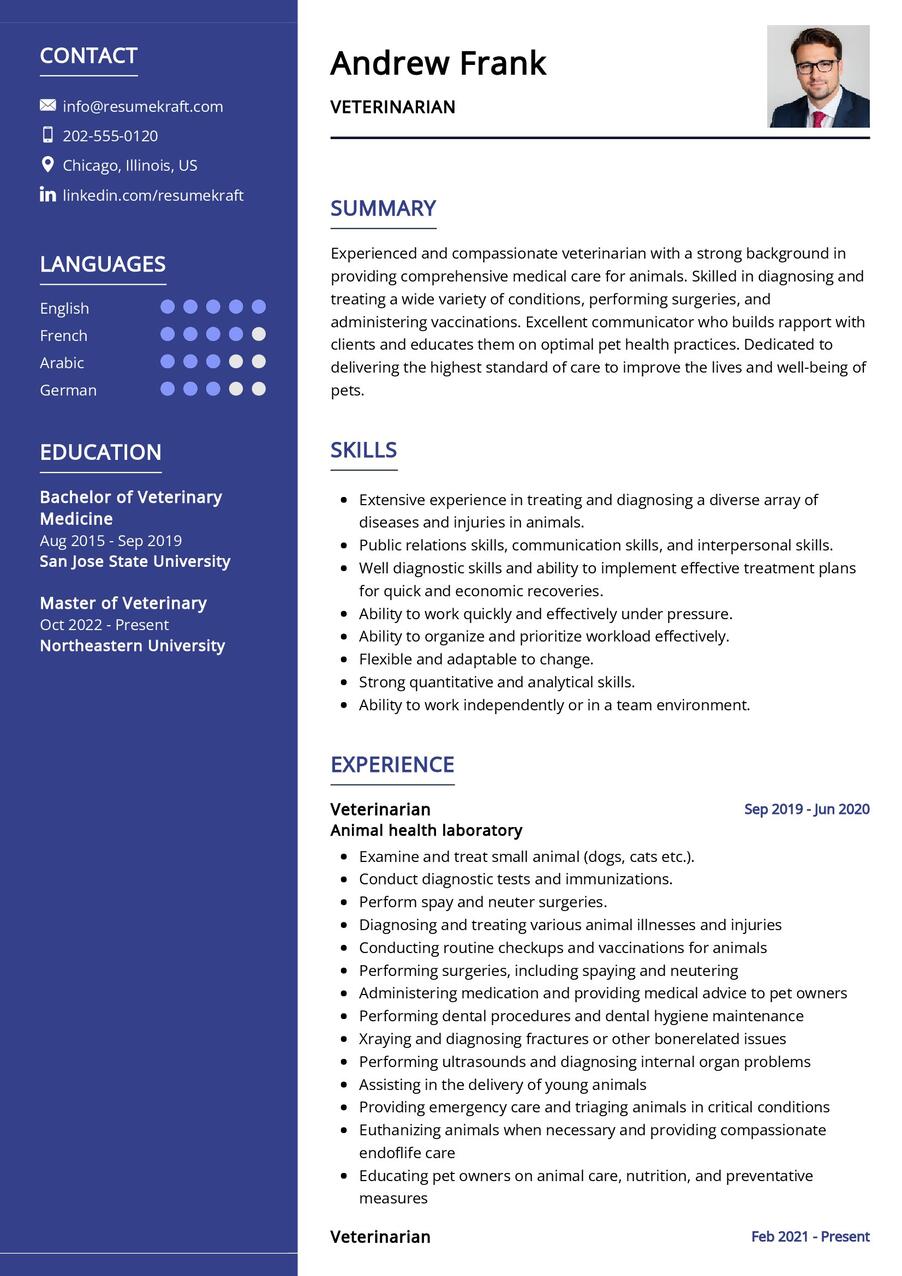Exploring the Vital Role of a Veterinarian in Today’s World
As animal companionship continues to play a crucial role in our lives, the demand for skilled veterinarians has never been higher. The position of a Veterinarian involves a unique blend of medical expertise, compassion for animals, and effective communication with pet owners. Let’s delve into the multifaceted role of a Veterinarian, understanding the qualifications, responsibilities, and skills required for this rewarding profession.
Requirements for Becoming a Veterinarian
Embarking on the journey to become a Veterinarian requires meeting specific educational and experiential milestones. Here are the key prerequisites for stepping into the shoes of a compassionate animal healthcare provider:
- Completion of a Doctor of Veterinary Medicine (DVM) degree from an accredited veterinary school.
- Acquiring hands-on experience through internships or externships in veterinary clinics or hospitals.
- Demonstrating a deep understanding of animal anatomy, physiology, and common health issues.
- Developing strong diagnostic and problem-solving skills essential for identifying and treating various animal ailments.
- Excellent communication skills to effectively interact with pet owners, explaining diagnoses and treatment plans clearly.
- Empathy and compassion towards animals and their owners, creating a supportive and caring environment.
- Remaining updated on advancements in veterinary medicine through continuous learning and professional development.
Securing additional certifications or specializing in areas such as surgery, dentistry, or internal medicine can enhance one’s profile in this competitive field.
Responsibilities of a Veterinarian
The role of a Veterinarian extends beyond clinical expertise, encompassing a wide range of responsibilities to ensure the well-being of animals under their care. Here are the core duties that define the daily life of a Veterinarian:
- Performing comprehensive physical examinations to assess the overall health of animals.
- Diagnosing and treating illnesses, injuries, and other health conditions in various animal species.
- Conducting surgeries and medical procedures, ensuring the safety and comfort of the animals.
- Providing preventive care, including vaccinations, parasite control, and dental care.
- Offering nutritional advice and creating dietary plans for pets with specific health needs.
- Communicating with pet owners, discussing treatment options, prognosis, and follow-up care.
- Collaborating with veterinary technicians and support staff to deliver comprehensive and compassionate care.
- Staying informed about regulatory changes and participating in community outreach programs.
Each responsibility comes with its own set of challenges and rewards, contributing to the fulfilling nature of a career in veterinary medicine.
Veterinarian Resume Writing Tips
Crafting a compelling resume is essential for showcasing your skills and experience as a Veterinarian. Here are some tips to help you create a standout resume that resonates with potential employers:
- Highlight your clinical experience, emphasizing the range of animals you have treated and medical procedures you have performed.
- Showcase your communication skills by including examples of effectively explaining complex medical issues to pet owners.
- Include any additional certifications or specialized training you have undergone, demonstrating your commitment to professional development.
- Use quantifiable metrics to highlight achievements, such as successful surgeries, positive patient outcomes, or improvements in clinic efficiency.
- Personalize your resume for each application, tailoring it to align with the specific requirements of the veterinary position.
Your resume is a reflection of your dedication to animal health and your proficiency as a Veterinarian.
Veterinarian Resume Summary Examples
Your resume summary serves as the opening statement of your career narrative. Craft a powerful summary that encapsulates your skills and experience as a Veterinarian. Here are some examples to inspire you:
- “Compassionate Veterinarian with a DVM degree and a decade of experience in small animal medicine. Proven track record in surgical procedures and preventive care, dedicated to ensuring the well-being of furry companions.”
- “Experienced Veterinarian specializing in equine medicine, with a focus on lameness evaluations and reproductive health. Strong communicator with a passion for educating horse owners on optimal care practices.”
- “Dedicated and empathetic Veterinarian with expertise in exotic pet care. Skilled in diagnostics, treatment planning, and client education. Committed to staying at the forefront of veterinary medicine through continuous learning.”
Your summary sets the tone for your resume, offering a glimpse into your unique strengths as a Veterinarian.
Create a Detailed Experience Section for Your Veterinarian Resume
Your experience section is the heart of your resume, narrating the story of your veterinary career. Provide detailed examples of your professional journey, highlighting key achievements and milestones. Here are some examples to guide you:
- “Led a team of veterinary professionals in a busy urban clinic, overseeing the care of over 500 animals monthly. Implemented a streamlined appointment system, reducing wait times by 30%.”
- “Pioneered a community outreach program providing low-cost spaying and neutering services, contributing to a 20% decrease in the local stray animal population.”
- “Developed and conducted educational seminars for pet owners, focusing on preventive care and early detection of common health issues. Increased client awareness and participation in wellness programs by 40%.”
Each experience is a chapter in your veterinary story, showcasing your impact on animal health and community well-being.
Educational Background for Your Veterinarian Resume
Your educational journey is a testament to your commitment to veterinary medicine. Clearly outline your academic achievements to build credibility in your field. Here’s how you can present your educational milestones:
- Doctor of Veterinary Medicine (DVM), XYZ Veterinary School, a comprehensive program providing in-depth knowledge of small and large animal medicine, 2012.
- Bachelor of Science in Animal Science, ABC University, laying the foundation for your understanding of animal biology and behavior, 2008.
- Board Certified in Small Animal Medicine, showcasing your expertise and commitment to excellence in the field, 2015.
Each educational qualification represents a step forward in your journey towards becoming a skilled Veterinarian.
Key Skills for a Veterinarian Resume
Your skill set is your toolkit, encompassing a range of abilities that contribute to your effectiveness as a Veterinarian. Here are the essential skills that every veterinarian should possess:
Soft Skills:
- Empathy and compassion, fostering a caring environment for both animals and their owners.
- Effective communication, ensuring clear and empathetic interactions with pet owners and team members.
- Problem-solving abilities, crucial for diagnosing and treating complex health issues in animals.
- Attention to detail, ensuring accuracy in diagnoses and treatment plans.
- Adaptability and resilience, facing the challenges of a dynamic veterinary environment.
Hard Skills:
- Surgical expertise, proficiency in performing various surgical procedures on different animal species.
- Diagnostic skills, utilizing imaging technologies and laboratory tests to identify and understand health issues.
- Knowledge of pharmaceuticals, understanding and prescribing medications tailored to the needs of individual animals.
- Dentistry skills, providing comprehensive dental care for pets.
- Client education, effectively conveying medical information and preventive care practices to pet owners.
Each skill is a tool in your arsenal, contributing to your success as a Veterinarian.
Common Mistakes to Avoid When Writing a Veterinarian Resume
As you craft your resume, steer clear of common pitfalls that can impact your chances of securing the ideal veterinary position. Here are some mistakes to avoid:
- Avoid using a generic resume template; tailor each application to the specific veterinary role you are applying for.
- Focus on achievements rather than just listing job duties to showcase the impact you’ve had in previous roles.
- Don’t underestimate the importance of a cover letter; use it as an opportunity to convey your passion for veterinary medicine and your fit for the position.
- Balance technical language with layman’s terms to ensure your resume is accessible to a wide audience, including those without veterinary expertise.
- Proofread your resume carefully to avoid errors that could negatively impact your professional image.
Avoiding these mistakes will help you create a resume that stands out in the competitive field of veterinary medicine.
Key Takeaways for Your Veterinarian Resume
As you wrap up your resume-building journey, remember these key takeaways to ensure your document effectively represents your unique strengths as a Veterinarian:
- Emphasize your clinical experience and the range of animals you have worked with to showcase your versatility.
- Showcase your communication skills, both in client interactions and collaboration with veterinary colleagues.
- Highlight any additional certifications or specialized training to demonstrate your commitment to ongoing professional development.
- Quantify your achievements using metrics to provide tangible evidence of your impact in previous roles.
Your resume is not just a document; it’s a canvas where you paint the story of your veterinary career, illustrating your dedication to animal health and well-being. Best of luck in your pursuit of a fulfilling veterinary role!
Finally, feel free to utilize resources like AI Resume Builder, Resume Design, Resume Samples, Resume Examples, Resume Skills, Resume Help, Resume Synonyms, and Job Responsibilities to create a standout application and prepare for the Veterinarian job interview questions.


